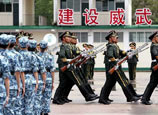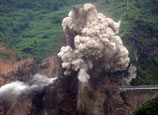
I. Policy Adjustment
According to the 2010 NDPG, Japan is committed to three major security and strategic objectives by four means. The three major objectives include ensuring Japan’s peace and security, improving Asia-Pacific security environment and guaranteeing international security; and contributing to world peace, stability and security. The four means are, namely, effort on the part of Japan, cooperation with allies, cooperation within the Asia-Pacific region, and global cooperation. In other words, Japan, in order to maintain national security and realize its security interests, is ready to conduct multi-layer security cooperation with the U.S., Asia-Pacific powers, and the international community. There seems no change or revision in the objectives and means, yet, significant changes did take place in Japan’s security policies.
A. “Normalization” of national defense is stepped up under conservative governments.
Firstly, progress was made by Noda’s conservative government in its bid for national defense “normalization”. When the Democratic Party came to power in 2012, “strengthening military power” was not included in Japan’s efforts to seek a major-power status. For more than three years in power, from Hatoyama to Noda, the security policy of the Democratic Party had been gaining momentum, gradually swinging from the leftist to the rightist policy platform. In the 2009 campaign of the House of Representatives, the Democratic Party represented by moderate Hatoyama did not mention its defense doctrine in its campaign platform. By 2010, after the ship collision near the Diaoyu Islands and other incidents, Kan’s administration returned to the military and security policy of“guarding against China while being close with the U.S.” with its new defense program outlines. The 2010 NDPG echoed the guidelines previously released by the Liberal Democratic Party (LDP). But Kan’s government had been unstable, and as a result, did not score much in its military buildup. Formed as a conservative and hawkish government in 2011, the Hatoyama administration was rather ambitious in “normalizing” national defense. In the 2012 general election, military-related ideas such as “unswervingly maintaining sovereignty, developing defense force, improving mobile defense force, attaching importance to the Southwest, participating in maintaining security of global commons such as air, space, sea and cyberspace” have been incorporated into its campaign platform. From December 2011 to the end of 2012, the Hatoyama administration has made significant progress in easing the “three principles concerning weapons exportation”, revising the Guidelines for Japan-U.S. Defense Cooperation and making amendments to relevant legal documents for future military employment of space and nuclear energy, and establishing an independent satellite surveillance system. All these are important issues concerning Japan’s defense principles and policies. Led by the Hatoyama administration, security policy of the Democratic Party is similar to that of the LDP; in actuality, there is a tendency of convergence in security policies of the two parties.
Secondly, the Abe administration, formed in December 2012, has been more enthusiastic and ambitious in pushing forward “defense normalization” and “military rise”. To certain extent, principles and policies adopted by the Abe administration is a reinforced version of his predecessor’s. Mr. Abe has long sought to get rid of the so-called “postwar regime” and make Japan a normal nation, especially in terms of national defense. At the beginning of 2013, he created two special councils for discussions of collective self-defense and a Japanese version of National Security Council (NSC). In fact, for the few months since Mr. Abe became Prime Minister, the Japanese government has taken historic steps in attempting to revise Japanese constitution, create national defense force, amend the 2010 NDPG, exercise collective self-defense, establish an NSC, raise military expenditure, and build up military strength. Mr. Abe is keen on making breakthroughs in easing restrictions on Japan’s military buildup, indicating Japan’s will and resolve in pursuing defense “normalization” and a major-military-power status.
【11】 【12】 【13】 【14】 【15】 【16】 【17】


















 Elder couples celebrate golden wedding anniversary in Hangzhou
Elder couples celebrate golden wedding anniversary in Hangzhou


![]()
